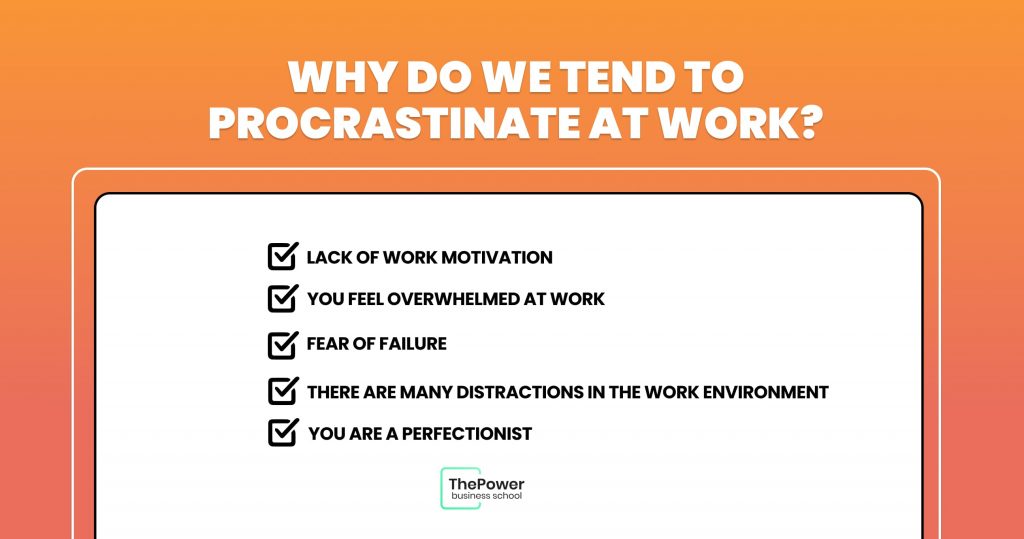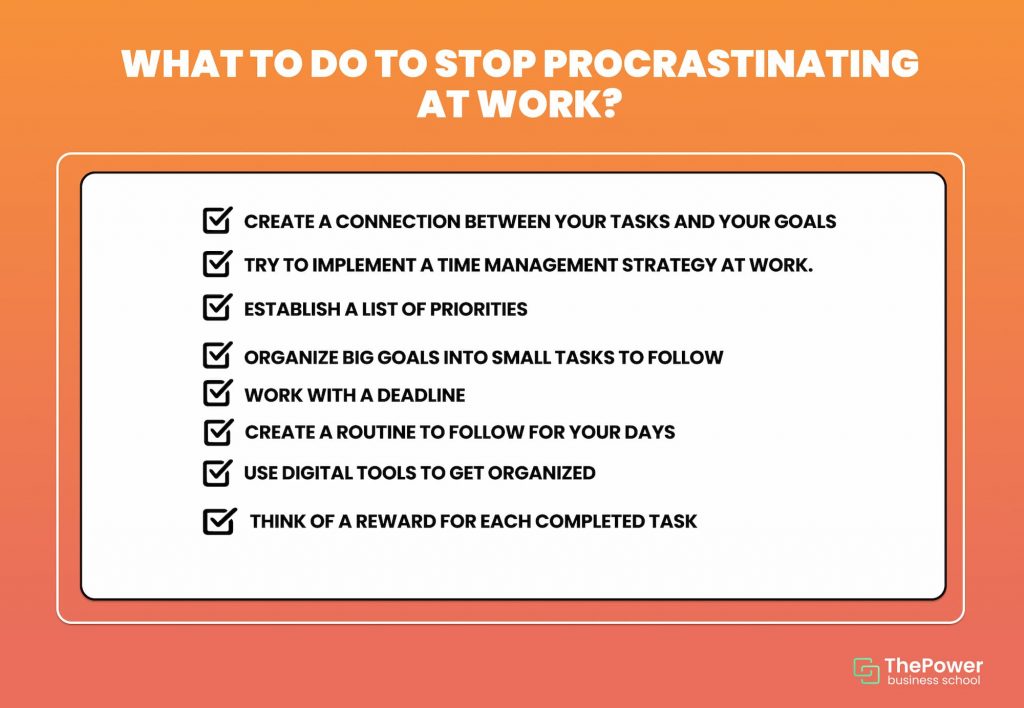
Franco Brutti
Surely more than once you’ve started to work and got immediately distracted by something else.
Whether it's social networks, a conversation, an internet search, a video or even because you remembered you needed to do some extra task.
If you’ve experienced this, you will know that this is something that makes you lose your focus and it makes it hard to get back to work when it’s time.
This is known as procrastination and it’s something that happens to us humans with everything: with work, academic life and even with home responsibilities...
If you’ve already reached the point where this is a situation that bothers you, then you should take action to put an end once and for all to procrastination and to waste all the time it wastes.
That’s why we’ve prepared for you a complete article with infallible tips that will allow you to stop procrastinating at work.
But... What is procrastination?
As always, let's start with the definition of the topic so that even people who did not know about it, have a clearer idea of what it is.
Procrastination refers to the tendency to postpone or delay an important task instead of doing it right away.
In other words, procrastination is putting off until later what should be done now.
Although it’s something we tend to do unconsciously, the truth is that procrastination can affect many areas of life, but it’s especially present in the workplace and academia, where tasks and deadlines are often important and urgent.
The most ironic part is that people who procrastinate often feel a sense of anxiety or stress about not completing their tasks on time, which can affect their emotional well-being and their effectiveness at work or in their studies.
So, as much as procrastinating is something that allows us to enjoy some free time while we are busy, the truth is that in the end it will only bring us more disadvantages than advantages.
Why do we tend to procrastinate at work?
As we’ve mentioned before, procrastination is something that is usually done unconsciously, but the truth is that there may be implicit reasons that lead you to do it.
Of course, a person who procrastinates in his or her work schedule does not usually stop to analyze what these motives may be.
However, several psychological studies have come up with some approaches that may be the answer to this.
We have reviewed them and that’s why we will talk about some of the most frequent reasons why this happens:
1. Lack of work motivation
Undoubtedly, one of the main reasons that lead people to waste time while working is a clear lack of work motivation.
When you do not feel encouraged by the idea of working, it’s normal that you procrastinate more and more every time.
That’s why it’s so important that large companies and businesses strive to give good reasons to work to all their employees equally.
2. You feel overwhelmed at work
There are many cases where employees are left in charge of tasks that they can't cope with because they haven't been trained to complete them.
There are also cases in which employees are delegated responsibilities that they should not be taking on themselves.
If this is your case, you should know that feeling overwhelmed is something that influences the time you spend procrastinating.
This is normal and understandable because if you don't know how to deal with a work responsibility, you will prefer to procrastinate for as long as possible.
3. Fear of failure
It should also be noted that there are some business projects that are of great importance and that make employees fear failure.
These types of negative feelings or emotions within the work environment make people, without thinking about it, prefer to spend their time procrastinating.
4. There are many distractions in the work environment
Another possible cause for procrastination is distractions.
In an office where many employees live together, there’s usually a lot of external noise that does not allow you to concentrate as you would like.
For example, the typical conversations (and even discussions) between co-workers, or the sounds of electronic devices or notifications from each of the devices there.
Rest assured that, if this is your case, your mind, faced with the difficulty of concentration in which it finds itself, will increase its tendency to procrastinate.
5. You are a perfectionist
Although at first this may seem somewhat ironic, the truth is that the most perfectionist people are usually the ones who waste the most time procrastinating.
This is because, for this type of employee, the ideal conditions need to be in place to start working or to complete a task.
If everything is not in place for the job to go perfectly, the person will procrastinate until it is.

What to do to stop procrastinating at work?
Now that you have a more complete picture of what procrastination is all about, it's time to explain what you can do to stop it from happening.
There are a number of foolproof tips you can apply to avoid or reduce procrastination at work.
Of course, you should keep in mind that, for each employee, the tip that works best for him or her may be different from the one that works for someone else.
That's why we'll give you a varied list of tips to follow and you can try them out until you find the one that works best for you.
1. Create a connection between your tasks and your goals
All the tasks you perform on a daily basis at work are always part of a larger business objective.
However, many times employees overlook this and just work for the sake of working.
This can cause you to lose focus, and therefore motivation, which will lead to procrastination.
That’s why one of the main tips to follow is to establish connections between your objective and the business objective.
That way, you will become more aware of how important your work is and you will want to focus much more on completing the tasks you have pending.
2. Try to implement a work time management strategy
Time is usually one of the main enemies of people when it comes to work, because they feel that it flies away and that they can’t benefit from it at all.
That’s why it’s so important to know how to distribute work time well so that we can accomplish everything that needs to be done.
Faced with this type of difficulty, it’s important to work hand in hand with a time management strategy.
Fortunately, there are many strategies that were created by many professionals and have already been tested by thousands of people.
Each of them is done in a different way, but they all have the same goal: to organize your time in order to concentrate better.
Among some of the most globalized techniques are the following:
The Pomodoro technique.
The Getting Things Done method.
Timeboxing.
Time blocking.
The two-minute rule.
3. Establish a list of priorities
In most cases, employees usually have a list of tasks to accomplish over a specific period of time.
If this is the methodology they use in your company, the best thing you can do is to establish a list of priorities.
That is, keep a personal organization with which you can finish the most important jobs as soon as possible.
For this, of course, you must be clear about the importance of each of the tasks to be accomplished.
That way, you will be able to organize yourself internally to accomplish the most important ones first and the less relevant ones later.
4. Organize the big objectives into small tasks to follow
Now, if you are one of those employees who tend to have large responsibilities, it’s normal that you tend to procrastinate.
Large business projects usually have a fairly long completion time.
Of course, if you have a lot of time to complete it, you will delay the time to start it, until it is too late and you have to finish everything at the last minute.
To avoid this, you should take that big project and divide it into smaller tasks to follow.
This is how you will be able to complete things on time and feel like you are making progress, even if it’s little by little.
5. Work with a deadline
We know all too well that there are some work tasks that are often assigned without a deadline.
This is a fairly typical error on the part of companies and it generates a lack of control in the organization of the time of each of the workers.
Something similar to the previous case happens here, because if there is no deadline, you are going to postpone it until it is too late.
In these cases, the best thing you can do is to set a deadline yourself that is in line with the organization you already have.
That way, you will be able to combine all your tasks without a problem and you will be sure that you will not have to rush during the last days of the month.
6. Create a routine to follow for your days
Creating a routine is something that will not only help you at work, but also with your daily tasks in general.
That’s why an excellent strategy to avoid procrastination is to have a routine that you can follow to the letter.
The idea is to have a routine that includes all the responsibilities you need to fulfill and that is open to changes.
Because you know that from one week to the next the things you have to be in charge of have to change.
So, the best thing to do is to create a flexible routine that can help you, both with your work time and with the time you have to invest in the rest of your daily tasks.
7. Use digital tools to get organized
Most of today's work is done digitally and that’s why it can also be helpful to have an organizational tool that is also digital.
Today there are several programs and applications that allow you to create a calendar with the planning of everything you have to do.
In fact, you could talk to your superiors to create a group schedule for the entire work team.
In this way, everyone will be aware of each other's tasks and will better understand how the chain of responsibility is formed.
In addition, they will have an extra means of communication and data transmission in case they cannot all meet at the same time in a physical office.
8. Think of a reward for each completed task
Many times the mind tends to understand better the things you have to do if there is a reward involved.
That’s why it would be helpful for you to consider a reward according to the task you have to do.
For example, if you manage to finish the job in the stipulated time, you will be able to enjoy more leisure time or you will be able to leave the workspace earlier.

We are well aware that at first following these tips to the letter may take time, but it's all a matter of applying them consistently.
So, now that you know what to do to stop procrastinating, it's all a matter of setting your mind to it so you can consistently achieve your goal.
Let us know if after applying them, these tips have been helpful or if you have already applied some of them before and have given you the desired results.
Jun 26, 2023








